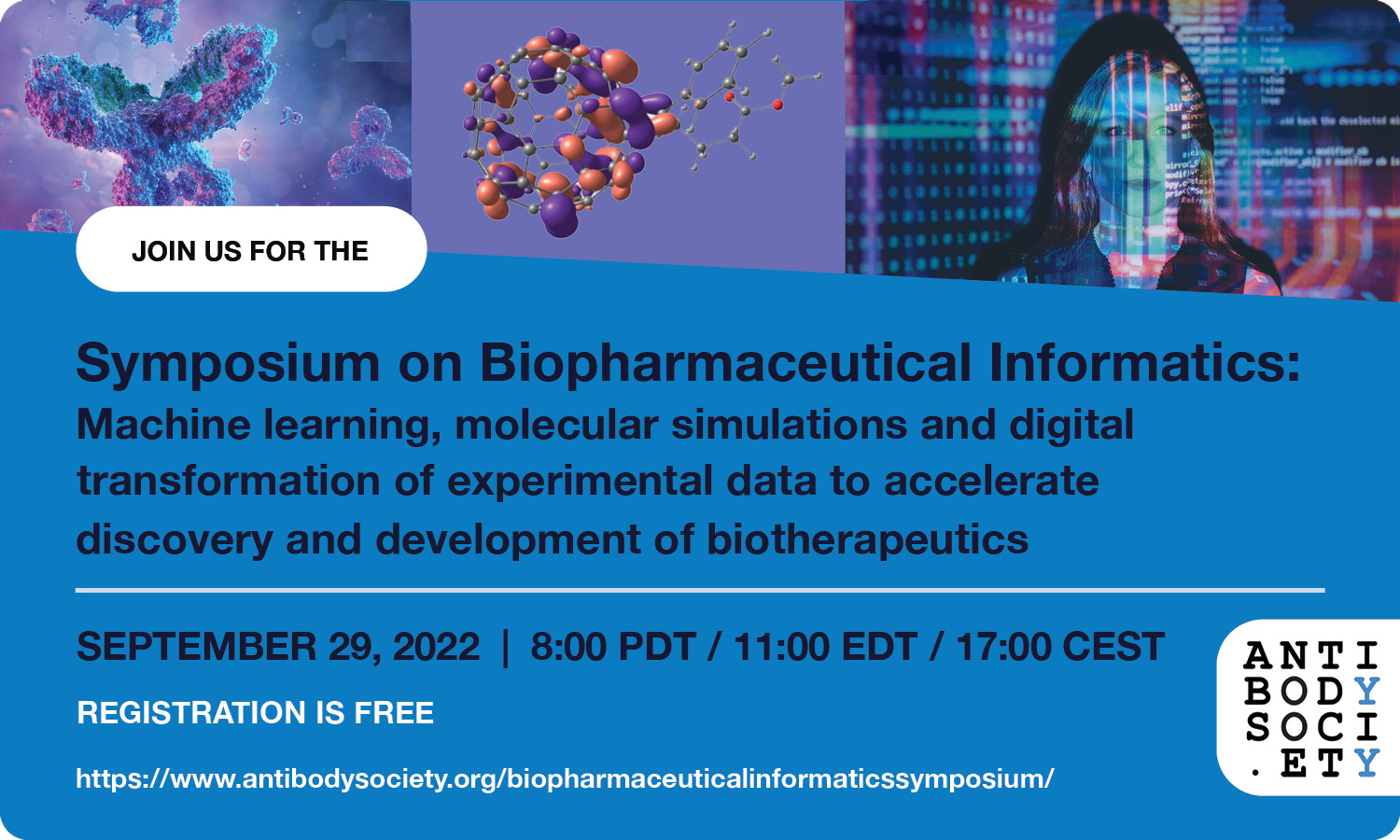
On Demand versions of the presentations and panel discussion are available on
our YouTube channel.
Despite the rapid industrialization of antibody-based drug discovery and development technologies over the past few decades, bringing novel biotherapeutics to patients with unmet medical needs remains a costly and risky business. For example, only one of five antibody-based biotherapeutic drug candidates that enter clinical trials becomes available in the market as a biotherapeutic drug product. If we extend this to earlier stages such as generation of therapeutic concepts, then our success rate is <5%. In addition to the low success rate, discovery and development cycles of biotherapeutics also suffer from high costs and long timelines. How can we improve this situation? Specifically, how can we bring novel biotherapeutic products to patients more often, faster and at affordable costs? Answers to these questions lie in the strategic vision of biopharmaceutical informatics. Biopharmaceutical informatics calls for the use of computational technologies such as AI/ML, digitalization, and molecular simulations to curate, analyze, visualize and interpret experimental data and provide data-informed inputs at every stage of biologic drug discovery and development projects. This interdisciplinary endeavor enables in-project as well as across project learnings from the laboratory results and also allows for disruptive innovations to accelerate biologic drug discovery. In recent years, biopharmaceutical informatics has emerged as a field of its own as the use of computation in biologic drug discovery and development has steadily increased, thereby, revolutionizing how we discover and develop biologic drugs.
Agenda:
| 11:00 – 11:10 EDT
Opening Remarks |
Host: Sandeep Kumar, Boehringer-Ingelheim Pharmaceutical Inc. |
| 11:10 – 11:55
Machine learning for biological sequence design with therapeutic applications |
Keynote Speaker: Lucy Colwell, Google Research
Prediction of protein function from sequence is a central challenge that allows us to discover new proteins with specific functionality. Experimental breakthroughs allow data on the relationship between sequence and function to be rapidly acquired that can be used to train and validate machine learning models that predict protein function directly from sequence. However, the cost and latency of wet-lab experiments require methods that find good sequences in few experimental rounds, where each round contains large batches of sequence designs. In this setting, I will discuss model-based optimization approaches that allow us to take advantage of sample inefficient methods and find diverse optimal sequence candidates for experimental evaluation. The potential of this approach is illustrated through design and experimental validation of proteins and peptides for therapeutic applications. |
| 11:55 – 12:25
Development of data and machine learning resources to tackle therapeutic antibody development |
Speaker: Konrad Krawczyk, Natural Antibody Realizing the full potential of computational methods in antibody drug discovery requires reliable access to antibody data and computational modeling resources. To tackle this issue we are systematizing antibody-specific data (e.g., patents, structures, literature) and modeling tools (e.g., structural modeling, language models) aimed for facilitated access to such resources for antibody engineers. Here, we will talk about progress and challenges in tackling heterogeneous datasets and developing antibody-specific machine learning models, focusing on their place in the drug discovery process.View video recording here. |
| 12:25 – 12:40 Break |
|
| 12:40 – 13:10
Simplifying complex antibody engineering using machine learning |
Speaker: Peter Tessier, University of Michigan Therapeutic antibody development requires selection and engineering of molecules with high affinity and other drug-like biophysical properties. Here we demonstrate the use of in vitro antibody library selections, high-throughput screening, and machine learning to greatly simplify the identification of antibodies with co-optimal levels of affinity and multiple key biophysical properties (non-specific binding, self-association, and stability).View video recording here. |
| 13:10 – 13:40
Building the pieces for computational multi-property optimisation of antibodies, from structure to binding to developability |
Speaker: Charlotte Deane, University of Oxford
Machine learning has shown its power across all of biology and in this talk I will describe some of the novel machine learning tools we are pioneering in the area of biotherapeutics from computational humanisation to accurate rapid structure prediction and virtual high throughput screening. |
| 13:40 – 14:25
Panel Discussion: |
Panel Moderator: Janice Reichert, The Antibody Society
Panelists: Lucy Colwell, Konrad Krawczyk, Peter Tessier, Charlotte Deane, Ajay Royyuru (IBM), and Andrew E. Nixon (Boehringer Ingelheim Pharmaceutical Inc.) |
| 14:25 – 14:30
Closing Remarks |
Host: Victor Greiff, University of Oslo |
Organizing Committee:
Sandeep Kumar, Victor Greiff, Janice Reichert, and Pam Borghardt.

